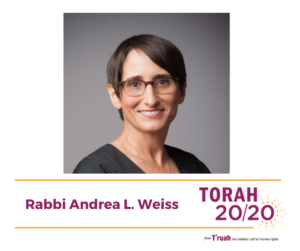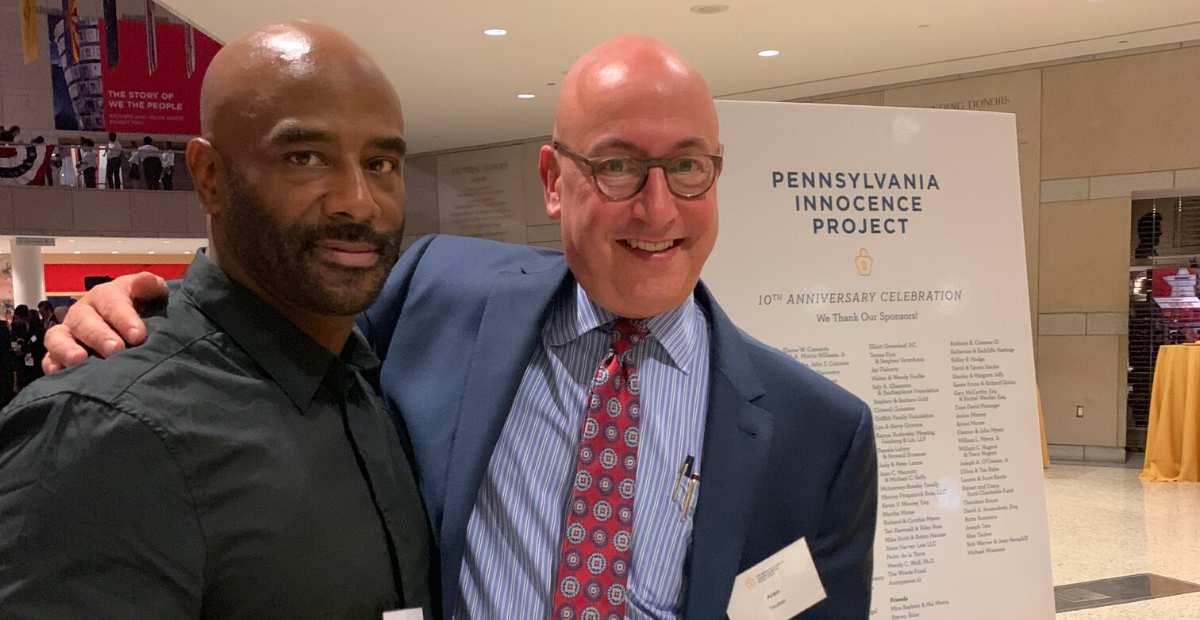A d’var Torah for Beshalach (Ex.13:17-17:16) by Rabbi Andrea L. Weiss, Ph.D.
This past July, Chester Hollman III was exonerated after serving 28 years in prison for a crime he did not commit. For 15 years, my husband, Philadelphia criminal defense attorney Alan Tauber, represented Chester and worked tirelessly to secure his freedom. For all those years, I knew about Chester’s heartbreaking case: how coincidence and corrupt detectives led to the arrest and incarceration of a law abiding 21-year-old African-American man in the early 1990s. But what I did not realize until this summer was just what a remarkable individual Chester is and how much Torah he has to teach us.
Franz Rosenzweig (1886-1929), the German Jewish theologian and philosopher, observed that modern Jewish learning moves “from life…back to Torah.” Taking that approach, I return to this week’s Torah portion Beshalach with new perspective, keeping in mind what I have learned from Chester since his release.
In our parshah, the Israelites’ first wilderness ordeal occurs immediately after their miraculous escape from Egypt. In one verse (Exodus 15:21), Miriam and the women celebrate Israel’s dramatic deliverance. Then, in the very next verse, Moses leads his followers into the wilderness, where they travel for three days without finding water. When they arrive at a place called Marah with impotable water, those who just marveled, “Who is like You, YHWH, among the gods?” (15:11), now demand, “What shall we drink?” (15:24). With God’s guidance, Moses finds a piece of wood and tosses it in the water; suddenly, the bitter water becomes sweet.
Sign up to receive Torah 20/20 in your inbox each week.
Not long before his release, once Chester finally allowed himself to hope that the end might be near, he volunteered for a program that allows inmates to train rescue dogs for adoption. He took a liking to a French Bulldog-pug mix named Buttons and asked his sister to apply for him to adopt the puppy. If he was getting out, Chester thought, he wanted to bring new life with him. When he got home, Chester first thought he would rename the dog “Freedom,” but he decided to name the puppy “Journey.” Chester understands what it means to leave the Sea of Reeds and enter the Wilderness of Shur.
When Chester and Alan spoke at a Philadelphia-area synagogue on Yom Kippur afternoon, Chester was asked what he plans to do now. Chester answered: “In my cell, there was a window that looked out to a bridge outside the prison walls. The whole time, I only thought about what it would be like to cross the bridge. I never thought about what I would do when I reached the other side.” Chester understands what it means to walk into the wilderness, unsure of where the journey will lead or how long it will take.
Find more commentaries on Parshat Beshalach
At the exoneration hearing that took place several weeks after Chester walked out of prison and crossed that bridge, Alan told the courtroom that in all their conversations, Chester never once displayed anger or acrimony about his fate. Alan recounted a prison visit years ago, after two witnesses recanted their coerced testimonies but failed to convince a judge to overturn Chester’s sentence of life in prison without parole. Alan asked Chester: “How can you not feel resentful about being in jail or furious at those whose lies put you in prison?” A gentle, soft-spoken man, Chester replied: “They’re victims too.” Chester understands what it means to wander through the wilderness without drinking the bitter water.
If you are wondering how a person like that could survive 28 years in prison, Chester will tell you that his family never doubted him. He will tell you how he called home every day and how his family drove for hours to visit him every weekend. He will tell you how his mother, who died while he was incarcerated, reassured him again and again that it might take a long time, but one day he would get out of jail. Chester understands what it means to endure the trials and tribulations of the wilderness while dreaming of the Promised Land.
Rabbi Andrea L. Weiss, Ph.D. is Jack, Joseph and Morton Mandel Provost and Associate Professor of Bible at Hebrew Union College-Jewish Institute of Religion. She is co-editor of American Values, Religious Voices: 100 Days, 100 Letters (University of Cincinnati Press, 2019) and associate editor of The Torah: A Women’s Commentary (CCAR Press, 2008).

